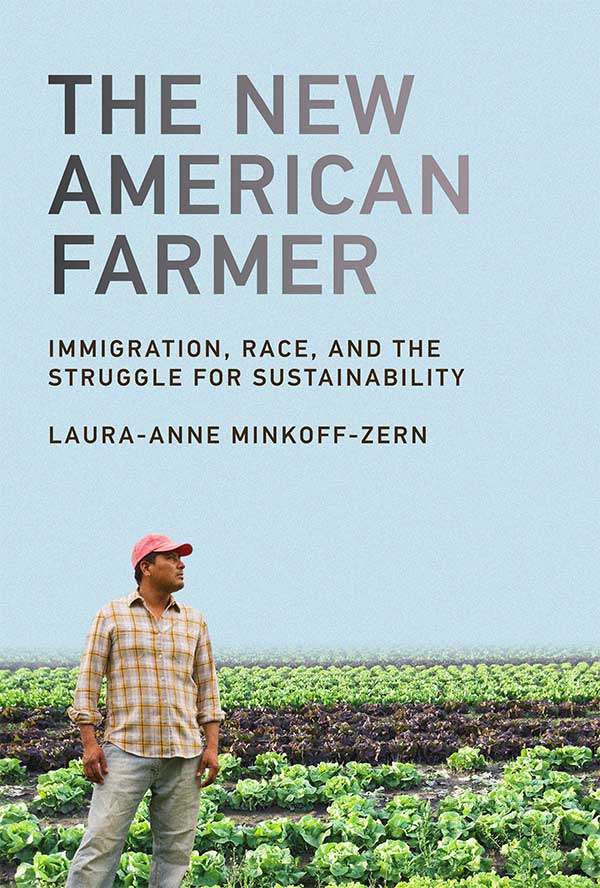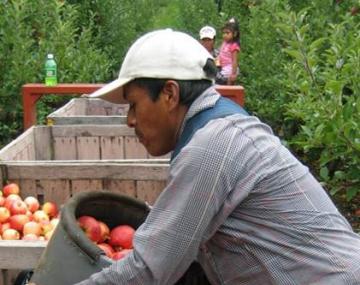
“In order to have a truly sustainable food system, both locally and globally, I argue food labor, and relatedly, racial justice and immigration policy, must be central to our understanding of how to change the food system,” says Minkoff-Zern, the Food Studies graduate director.
“In addition to addressing working conditions on farms and other parts of the food chain, food systems scholars and practitioners–and really anyone who eats–can and should be looking to the people who do the work to maintain our food system everyday as holders of knowledge and leaders in making the changes themselves,” she adds.
Minkoff-Zern, an affiliated faculty member in the departments of Geography in the Maxwell School of Citizenship and Public Affairs and Women’s and Gender Studies in the College of Arts and Sciences, has concentrated much of her research on immigrant farmers. Her 2019 book, “The New American Farmer: Immigration, Race, and the Struggle for Sustainability,” offered new perspectives on racial inequity and sustainable farming.

We asked Minkoff-Zern to explain her recent research, how food security and immigration are related, and why what happens to farm workers matters to you and me. Here’s that conversation:
Q: Can you summarize the focus of your research and the subsequent articles published in the “Journal of Agriculture, Food Systems, and Community Development” and the “Journal of Rural Studies?”
A: This research project looks at the federal H-2A Temporary Agricultural Workers program and how it functions on the ground. This program is essentially a work visa program for farmworkers who come to the U.S. primarily from Mexico and Caribbean and work for up to 10 months before they are required to return to their home country.
Our team at Syracuse worked with the Cornell Farmworker Program to better understand the conditions for both workers and farmers engaged in the program, with a focus on mid-sized farms. This was a mixed methods project, where we utilized interviews with farmers, workers, and intermediary agents; U.S. Department of Labor data; and media sources for our analysis. This study is one of the first to look at the work and usage conditions on small- to medium-size farms using this rapidly growing farm labor program.
Q: What stood out to you during your research?
A: We found that the program is challenging for mid-size farmers and problematic for workers. Yet it is often promoted as a bi-partisan, farmer-friendly, and worker-approved approach to address the lack of experienced and willing farm labor in the U.S.
Politicians, media, and lobbying organizations that promote the H-2A program assume it functions the same at all farm scales, ignoring the lack of resources on small- and medium-size farms to manage and pay for the additional human resources, paperwork, and requirements to use the program. For workers, the program provides a legal entry to the U.S. but mostly limits them to one farm/employer, making it difficult to speak up if things are not safe or fair at work.
The program also overlooks experienced undocumented workers, who have been working for low wages and under difficult conditions in U.S. agriculture for decades yet are unable to apply for these jobs and gain the potential benefits of the program.
Q: What conclusions did you draw?
A: We found that the program is not designed to support the small and middle-sized farmers who grow seasonally available fresh food, nor does it provide a just option for farmworkers. Yet, despite their critique, most farmers do say they still want access to the program, due to lack of better options.
Ultimately, this program and the related bill (Farm Workforce Modernization Act) are Band-Aid solutions to a much broader structural problem: producers and laborers in the food system get a smaller percentage of the food dollar, and workers operate within a broken immigration system, forcing them to settle for highly problematic employment options.
Q: The Farm Workforce Modernization Act, which has been passed by the House but not yet by Congress, involves changes to the H-2A program. Can you explain the changes that have been proposed?
A: Although this program generally has made up a small portion of the overall agricultural workforce since its inception in 1952, program usage tripled over the past seven years. This growing popularity has prompted heated debates about potential reforms, most recently regarding the Farm Workforce Modernization Act.
If this bill were to pass, the H-2A program would be expanded to include year-round agricultural industries, provide a pathway to citizenship for some workers, and temporarily cap the potential for wage increases for workers. It would also force the e-verify system on all agricultural producers, which checks the documentation status of workers. If passed, this would leave a large majority of the experienced farmworkers in the industry out of a job, pushing farmers into using the controversial H-2A program.
Q: What changes would you recommend based on your research?
A: There are no silver-bullet solutions to the problem of farm labor in the U.S. today. As fewer people in the U.S. grow up in rural areas and on farms, we lack an experienced, domestically born workforce. Additionally, farm labor has a long-rooted history in racial exploitation and relatedly, low wages and poor conditions.
To create a sustainable food system for both workers and farmers, the U.S. needs a more comprehensive agricultural immigration reform strategy, which includes workers that are already in the U.S. working in agriculture and allows for upward mobility for farmworkers.
Farmworkers come to the U.S. with agricultural knowledge and skills, including sustainable practices and how to grow biodiverse food systems. Instead of relegating them to a migrating labor force, a better program would help provide current workers–most of whom are not currently authorized to work in the U.S.–legal access to work and citizenship, so they can live and work without fear. This would also help farm owners, who would not have to fear losing their workforce to an immigration raid and avoid the expensive and bureaucratic process of working with the H-2A program.

Q: What can be done to connect your research and recommendations to the lawmakers who are making the decisions?
A: As I mentioned, this project was a partnership with The Cornell Farmworker Program and its director, Mary Jo Dudley. The Cornell Farmworker Program works to disseminate research projects such as ours to a broader policy making and practitioner audience. We are still working on publishing our third article from this research, and plan to make more formal recommendations to policy makers as all our findings become public.
Q: Why should people care about what happens with the Farm Workforce Modernization Act and the H-2A program? How does it impact our everyday lives?
A: Anyone that cares about access to fresh and healthy food should care about farm labor and related immigration policy. Farmworkers do the labor every day to bring food to our plates. Without a functioning system to justly and safely support workers on a regional and national scale, we risk a food system more vulnerable to climatic shifts and global upheaval.
Q: You worked closely with Food Studies graduate students on your recent research. Can you describe the perspectives they brought to this work?
A: Both Anna Zoodsma G’22 and Michelle Tynan G’23 have been essential to the research on this project and are co-authors on the papers. Students bring unique perspectives, based on their own professional experience, when looking at interview data, literature, and media.
For example, Michelle worked at the USDA (United States Department of Agriculture) before starting graduate school in Food Studies, and Anna was doing practicum work on a local project with refugee farmers. Anna took the lead in conducting the media analysis and was the first author on our most policy relevant paper recently published in the “Journal of Agriculture, Food Systems, and Community Development.”
